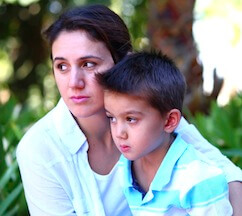It has been said that the only thing people fear more than death is public speaking. Unfortunately there is no Toastmasters program to help us prepare for the experience of loss and the resulting grief.
This week on Autism Spectrum Radio we askedauthor Karla Helbert to share her insights as a psychotherapist and bereavement counselor who works with individuals on the autism spectrum.
Although you may not expect this topic to be very uplifting, I found it to be personally meaningful with important information that all families could benefit from hearing.
As Karla said, if you live long enough and you love, you will experience grief. The question then becomes, how do we deal with our grief and how do we support our children with autism to process theirs?
The first thing to know is that when someone is going through the experience of grief, they do not need to be fixed. Nothing is wrong with you (or them). You are grieving and that is a very natural, healthy experience. Which is not to say it easy or comfortable.
Grief is an individual process: it is different for each person and can be different from day to day. What works for you or your child today may not work tomorrow. Staying flexible and compassionate can assist with finding your way through the process. Our kids on the spectrum don’t always convey their emotions so it can be helpful to remember that just because we don’t see what they are feeling, doesn’t mean they are not feeling.
Grief can feel chaotic and is often triggered when you least expect it. Sense memory, a song or even the weather can stir up emotions. It is not uncommon for an individual who is in the grieving process to feel like they are going crazy. Again, grief is natural and normal, and so are the resulting feelings.
So how do we support our kids with autism?
Talk to your kids clearly and in real terms about death. Using words like “lost” or “passed” can be confusing to our kids.
Karla shared that grief is a process that demands ritual. This includes but is not limited to the funeral and other religious practices. You will want to prepare your child for what to expect at a funeral or other event and then let them choose if they want to participate. It is also wise to have support and back-up plans for the child should they choose to leave. If the child is grieving, it is likely that you, the parent, are also grieving and you need to take care of yourself as well as your child. Connecting with an item owned by the deceased, cooking a favorite meal and spending time with loved ones can all be an opportunity to create ritual. Creative expression is encouraged as journaling and art can be very therapeutic. These rituals create an opening so the grieving individual can be present with their feelings. Allowing these moments and then concluding the ritual (cleaning up the meal, putting away the personal item etc.) allows you to transition back into your typical routine.
I recently experienced a loss in my family when my young cousins lost their grandfather. I now more fully appreciate how the religious traditions and rituals we practiced created a roadmap for the journey of grief.
As Rob pointed out during the show, every child, regardless of functioning level responds to routine. In this way, a child’s ABA program can be very supportive with creating meaningful rituals that honor the grieving process.
For more information about Karla Helbert’s work and her book go to: www.karlahelbert.com
Listen to the entire episode of Autism Spectrum Radio with Karla Helbert on our Radio Show Page







